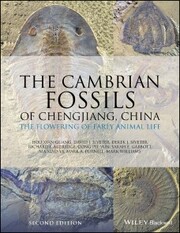Detailansicht
The Cambrian Fossils of Chengjiang, China
eBook - The Flowering of Early Animal Life
Siveter, David J/Williams, Mark/Aldridge, Richard J et al
ISBN/EAN: 9781118896310
Umbreit-Nr.: 4430787
Sprache:
Englisch
Umfang: 336 S., 220.33 MB
Format in cm:
Einband:
Keine Angabe
Erschienen am 08.03.2017
Auflage: 2/2017
E-Book
Format: PDF
DRM: Adobe DRM
- Zusatztext
- <p>The celebrated lower Cambrian Chengjiang biota of Yunnan Province, China, represents one of the most significant ever paleontological discoveries. Deposits of ancient mudstone, about 520 million years old, have yielded a spectacular variety of exquisitely preserved fossils that record the early diversification of animal life. Since the discovery of the first specimens in 1984, many thousands of fossils have been collected, exceptionally preserving not just the shells and carapaces of the animals, but also their soft tissues in fine detail. This special preservation has produced fossils of rare beauty; they are also of outstanding scientific importance as sources of evidence about the origins of animal groups that have sustained global biodiversity to the present day.</p><p>Much of the scientific documentation of the Chengjiang biota is in Chinese, and the first edition of this book was the first in English to provide fossil enthusiasts with a comprehensive overview of the fauna. The second edition has been fully updated and includes a new chapter on other exceptionally preserved fossils of Cambrian age, exciting new fossil finds from Chengjiang, and a phylogenetic framework for the biota. Displaying some 250 figures of marvelous specimens, this book presents to professional and amateur paleontologists, and all those fascinated by evolutionary biology, the aesthetic and scientific quality of the Chengjiang fossils.</p>
- Kurztext
- The celebrated lower Cambrian Chengjiang biota of Yunnan Province, China, represents one of the most significant ever paleontological discoveries. Deposits of ancient mudstone, about 520 million years old, have yielded a spectacular variety of exquisitely preserved fossils that record the early diversification of animal life. Since the discovery of the first specimens in 1984, many thousands of fossils have been collected, exceptionally preserving not just the shells and carapaces of the animals, but also their soft tissues in fine detail. This special preservation has produced fossils of rare beauty; they are also of outstanding scientific importance as sources of evidence about the origins of animal groups that have sustained global biodiversity to the present day. Much of the scientific documentation of the Chengjiang biota is in Chinese, and the first edition of this book was the first in English to provide fossil enthusiasts with a comprehensive overview of the fauna. The second edition has been fully updated and includes a new chapter on other exceptionally preserved fossils of Cambrian age, exciting new fossil finds from Chengjiang, and a phylogenetic framework for the biota. Displaying some 250 figures of marvelous specimens, this book presents to professional and amateur paleontologists, and all those fascinated by evolutionary biology, the aesthetic and scientific quality of the Chengjiang fossils.
- Autorenportrait
- <p><b>Hou Xian-guang</b> is former Director, Key Laboratory for Palaeobiology, Yunnan University, Kunming</p><p><b>David J. Siveter</b> is Professor Emeritus of Paleontology, University of Leicester</p><p><b>Derek J. Siveter</b> is Professor Emeritus of Earth Sciences, University of Oxford</p><p><b>Richard J. Aldridge</b> was Professor Emeritus and F.W. Bennett Professor of Geology, University of Leicester</p><p><b>Cong Pei-yun</b> is Professor of Paleobiology, Yunnan University, Kunming</p><p><b>Sarah E. Gabbott</b> is Professor of Paleobiology, University of Leicester</p><p><b>Ma Xiao-ya</b> is Professor of Paleobiology, Yunnan University, Kunming, and the Natural History Museum, London</p><p><b>Mark A. Purnell</b> is Professor of Paleobiology, University of Leicester</p><p><b>Mark Williams</b> is Professor of Paleobiology, University of Leicester</p>
